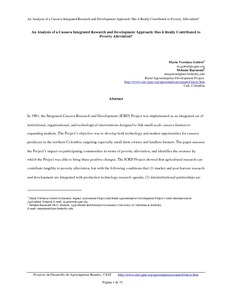An analysis of a cassava integrated research and development approach: has it really contributed to poverty alleviation?
In 1981, the Integrated Cassava Research and Development (ICRD) Project was implemented as an integrated set of institutional, organizational, and technological interventions designed to link small-scale cassava farmers to expanding markets. The Project?s objective was to develop both technology and market opportunities for cassava producers in the northern Colombia, targeting especially small farm owners and landless farmers. The paper assesses the Project?s impact on participating communities in terms of poverty alleviation, and identifies the avenues by which the Project was able to bring these positive changes. The ICRD Project showed that agricultural research can contribute tangibly to poverty alleviation, but with the following conditions that (1) market and post harvest research and development are integrated with production technology research agenda; (2) interinstitutional partnerships are developed, whereby different institutions with their own expertise, comparative advantages, and mandates collaborate to respond to the demands of local community organizations and individuals; and (3) existing social and human capital is used to create intimate networking among institutions, local social organizations, and individuals.

